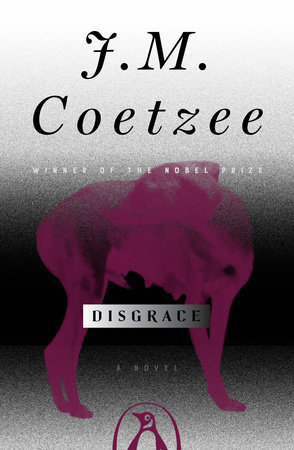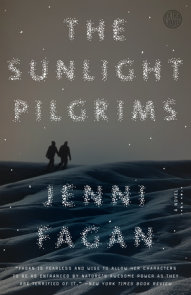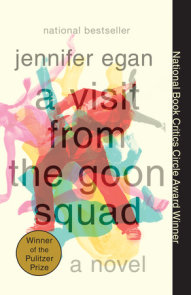READERS GUIDE
Questions and Topics for Discussion
INTRODUCTION
Set in post-apartheid South Africa, J. M. Coetzee’s searing novel tells the story of David Lurie, a twice divorced, 52-year-old professor of communications and Romantic Poetry at Cape Technical University. Lurie believes he has created a comfortable, if somewhat passionless, life for himself. He lives within his financial and emotional means. Though his position at the university has been reduced, he teaches his classes dutifully; and while age has diminished his attractiveness, weekly visits to a prostitute satisfy his sexual needs. He considers himself happy. But when Lurie seduces one of his students, he sets in motion a chain of events that will shatter his complacency and leave him utterly disgraced.
Lurie pursues his relationship with the young Melanie—whom he describes as having hips “as slim as a twelve-year-old’s”—obsessively and narcissistically, ignoring, on one occasion, her wish not to have sex. When Melanie and her father lodge a complaint against him, Lurie is brought before an academic committee where he admits he is guilty of all the charges but refuses to express any repentance for his acts. In the furor of the scandal, jeered at by students, threatened by Melanie’s boyfriend, ridiculed by his ex-wife, Lurie is forced to resign and flees Cape Town for his daughter Lucy’s smallholding in the country. There he struggles to rekindle his relationship with Lucy and to understand the changing relations of blacks and whites in the new South Africa. But when three black strangers appear at their house asking to make a phone call, a harrowing afternoon of violence follows which leaves both of them badly shaken and further estranged from one another. After a brief return to Cape Town, where Lurie discovers his home has also been vandalized, he decides to stay on with his daughter, who is pregnant with the child of one of her attackers. Now thoroughly humiliated, Lurie devotes himself to volunteering at the animal clinic, where he helps put down diseased and unwanted dogs. It is here, Coetzee seems to suggest, that Lurie gains a redeeming sense of compassion absent from his life up to this point.
Written with the austere clarity that has made J. M. Coetzee the winner of two Booker Prizes, Disgrace explores the downfall of one man and dramatizes, with unforgettable, at times almost unbearable, vividness the plight of a country caught in the chaotic aftermath of centuries of racial oppression.
ABOUT J. M. COETZEEBorn in Cape Town, South Africa, on February 9, 1940, John Michael Coetzee studied first at Cape Town and later at the University of Texas at Austin, where he earned a Ph.D. degree in literature. In 1972 he returned to South Africa and joined the faculty of the University of Cape Town. His works of fiction include Dusklands, Waiting for the Barbarians, which won South Africa’s highest literary honor, the Central News Agency Literary Award, and the Life and Times of Michael K., for which Coetzee was awarded his first Booker Prize in 1983. He has also published a memoir, Boyhood: Scenes From a Provincial Life, and several essays collections. He has won many other literary prizes including the Lannan Award for Fiction, the Jerusalem Prize and The Irish Times International Fiction Prize. In 1999 he again won Britain’s prestigious Booker Prize for Disgrace, becoming the first author to win the award twice in its 31-year history.
PRAISE“—Disgrace is not a hard or obscure book—it is, among other things, compulsively readable—but what it may well be is an authentically spiritual document, a lament for the soul of a disgraced century.”
—The New Yorker
“—A subtly brilliant commentary on the nature and balance of power in his homeland…Disgrace is a mini-opera without music by a writer at the top of his form.”
—Time
“—Mr. Coetzee, in prose lean yet simmering with feeling, has indeed achieved a lasting work: a novel as haunting and powerful as Albert Camus’s The Stranger.”
—The Wall Street Journal
“A tough, sad, stunning novel.”
—Baltimore Sun
DISCUSSION QUESTIONSThe novel begins by telling us that “For a man his age, fifty-two, divorced, he has, to his mind, solved the problem of sex rather well.” What can you infer about David Lurie’s character from this sentence? In what ways is it significant, particularly in relation to the events that follow, that he views sex as a “problem” and that his “solution” depends upon a prostitute?
Lurie describes sexual intercourse with the prostitute Soraya as being like the copulation of snakes, “lengthy, absorbed, but rather abstract, rather dry, even at its hottest.” When he decides to seduce his student, Melanie, they are passing through the college gardens. After their affair has been discovered Melanie’s father says that he never thought he was sending his daughter into “a nest of vipers.” Lurie has also written a book about Faust and Mephistopheles and explicates for his class a poem by Byron about the fallen angel, Lucifer, whom Lurie describes as being “condemned to solitude.” What do you think Coetzee is trying to suggest through this confluence of details? How clearly does Lurie himself understand his behavior? How does his reading of the Byron poem prefigure his own fate?
When Lurie shows up unexpectedly at Melanie’s flat, “she is too surprised to resist the intruder who thrusts himself upon her.” Later, he tells himself that it was “not rape, not quite that, but undesired nevertheless, undesired to the core.” How do you view what happens in this scene? Is it rape?
How would you characterize Lurie’s attitude before the academic committee investigating the charges of harassment brought against him? Is the committee justified in asking for more than an admission of guilt? Why does Lurie refuse to assent to the fairly simple demands that would save his job? What consequences, practical and spiritual, follow from this refusal?
Lurie claims that in his relationship with Melanie, he was “a servant of Eros” and that his case rests on the rights of desire. On the God who makes even the small birds quiver.” Is this an acceptable explanation of his actions? Do you think it is sincere?
What parallels do you see between the attack on Lurie and his daughter Lucy and Lurie’s own treatment of Melanie and Melanie’s father? To what extent do you think Coetzee wants us to see Lucy’s rape as a punishment for Lurie’s undesired sexual encounter with Melanie? Is this an instance of the sins of the father being visited upon the child?
In the course of the attack, Lurie is burned and blinded, temporarily, in one eye. What symbolic value might attach to these events? In what other ways has Lurie been blind? What significance does fire have for him?
Why does Lucy refuse to report her rape? How is her decision related to the changed relations between blacks and whites in post-apartheid South Africa? Why does she accept Petrus’ protection even after he has been implicated in the attack?
How do you feel about Lucy’s neighbor Petrus? To what extent do you think he was involved in the attack? What are his motives? What are the motives of the attackers? In what ways does Petrus embody the transition South Africa is making between apartheid and democracy? In what sense will Lucy’s child also represent that transition?
During a heated argument about whether animals have souls and how they should be treated, Lurie tells his daughter: “As for the animals, by all means let us be kind to them. But let us not lose perspective. We are of a different order of creation from the animals. Not higher necessarily, just different. So if we are going to be kind, let it be out of simple generosity, not because we feel guilty or fear retribution.” In what ways does this speech echo the logic of racial oppression and apartheid?
Throughout Disgrace, Lurie contemplates writing an opera based on Byron’s last years in Italy. Why is he so drawn to Byron? How does Byron’s situation in Italy resemble Lurie’s own? What ironies do you see in the fact that Lurie composes the music for his opera on a banjo and that he considers including a part for a dog?
From virtually the first page to the last, David Lurie suffers one devastating humiliation after another. He loses his job and his reputation. He is forced to flee Cape Town to live with his daughter on her smallholding in the country. There he is beaten and burned and trapped helplessly in the bathroom while his daughter is raped. Finally, he ends up ferrying dead dogs to the incinerator. Is there a meaning or purpose in his suffering? Is he in some way better off at the end of the novel than he was at the beginning? How has he changed?
Disgrace is narrated in the present tense, largely through David Lurie’s consciousness, though not in the first person. What effect does this method of narration have on how the story unfolds? How would the novel differ if told in the past tense? At what points do you sense a divergence between Lurie’s view of himself and the narrator’s view of him?
In what ways can the events dramatized in Disgrace be seen as a result of South Africa’s long history of racial oppression? What does the novel imply about the larger themes of retribution and forgiveness and reversals of fortune? About the relation between the powerful and the powerless?






















